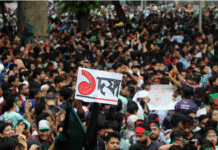TBS

If someone is asked, “What is the second largest intergovernmental organisation in the world?”, the answer may not come to his or her mind because the organisation is so ineffective that it has been obscured in oblivion from our collective psyche.
The Organisation of Islamic Cooperation (OIC) was founded in 1969 to unite Muslim-majority nations and advocate for their shared interests. It was envisioned as a powerful voice for the Islamic world. With 57 member states spanning four continents, it is the second-largest intergovernmental organisation globally, surpassed only by the United Nations.
Yet, it has always been ineffective and ceremonial, void of any real impact on geopolitics. And never before was it more evident than today, when Muslim countries like Palestine and Iran are relentlessly being bombarded by Israel, disregarding any international law or convention. And on 22 June, the US bombed Iranian nuclear facilities, showing support for Israel.
And all of it happened while the 51st session of the Council of Foreign Ministers (CFM) of the Organisation of Islamic Cooperation (OIC) was underway in Istanbul, Turkey. And it painfully reminded us of what little impact the OIC has on geopolitics. Not only the OIC, the Arab League and the Gulf Cooperation Council (GCC) have also been unable to prevent the aggression against Palestine and Iran.
The Muslim world’s most prominent coalitions — the OIC, Arab League, and GCC have become forums of rhetoric and ritual, incapable of confronting war, protecting civilians, or even defending their founding principles.
Israel’s relentless military operations in Gaza have claimed over 48,500 Palestinian lives since October 2023. It bombed Lebanon and Syria. Its provocations against Iran threaten further regional instability. And all of these exposed the OIC, Arab League, GCC as organisations mired in ineffectiveness. Their failure to halt atrocities in Gaza, prevent Israeli aggression against Iran, and wield meaningful geopolitical influence reflects deep-seated structural flaws, political fragmentation, and a troubling dependence on external powers, becoming a hollow symbol of Muslim unity.
The failure to protect Gaza: A betrayal of purpose
The Organisation of Islamic Cooperation (OIC) was formed in 1969 primarily in response to the arson attack on the Al-Aqsa Mosque in Jerusalem. And when the very OIC fails to save the Palestinians from a brutal genocide and ethnic cleansing, it creates a perception of betrayal among the Muslims, who see the OIC as complicit in their suffering through its passivity.
At the Riyadh summit on 11 November 2024, convened jointly with the Arab League, the OIC issued 31 resolutions condemning Israel’s aggression, demanding an immediate ceasefire, and calling for humanitarian aid corridors. Yet, these pronouncements, like those from previous summits, have failed to translate into tangible action.
The death toll in Gaza, predominantly women and children, continues to rise, with no evidence of OIC-led initiatives curbing Israel’s military campaign. The organisation’s resolutions are frequently described as “toothless”, lacking concrete measures such as severing diplomatic relations or imposing trade sanctions on Israel.
It is even more ironic for the Arab League, which was formed in 1945 to promote cooperation and coordination among Arab states, particularly in the face of colonial influence and the potential creation of a Jewish state in Palestine.
The Arab League said it will actively call on member states to take steps to gradually reduce military cooperation with Israel and encouraged an economic boycott, saying continued trade and military dealings would constitute complicity in Israel’s onslaught of Gaza. Yet, it remains only lip service.
In the aftermath of 7 October, the GCC countries were quick to condemn, yet it translated to nothing to stop the genocide.
Historical quagmire
When the colonial powers drew the map of the Middle East arbitrarily to exploit the resources, it created the blueprint for constant conflict, and the Arab nations were doomed to fail. Since the Islamic heartland was torn and conflicted, it undermines the agency of the other Muslim nations in the OIC.
The Abraham Accords, signed by the UAE, Bahrain, and Morocco, have normalised relations with Israel, creating a schism within the OIC. These countries, alongside others like Egypt and Jordan, maintain diplomatic or economic ties with Israel, undermining collective efforts to isolate it. Even Turkey, a vocal critic of Israel, exported $1.52 billion in goods to the Jewish state in 2023, revealing a duplicity that erodes the OIC’s credibility.
Rivalries between key members, notably Saudi Arabia and Iran, further paralyse decision-making. These fractures prevent the OIC, Arab League or GCC from formulating a cohesive strategy to pressure Israel or its allies, rendering its summits little more than forums for rhetorical posturing.
Moreover, these countries’ dependence on Western powers, particularly the United States, exacerbates their impotence. The US, Israel’s staunchest ally, provides billions in military aid and consistently vetoes UN Security Council resolutions calling for a Gaza ceasefire. Several OIC members, including Turkey, Egypt, and Jordan, host US military bases, which may indirectly facilitate Israel’s operations. This reliance on American security and economic support constrains these states’ willingness to challenge Israel, leaving the OIC’s diplomatic efforts stranded.
The organisation’s lack of enforcement mechanisms compounds this problem. With no standing military force or binding authority, it relies on international bodies like the UN, where US vetoes render its appeals ineffective. The OIC’s “helplessness” against Israeli forces, as noted in its own documents, acknowledges the fundamental lack of agency.
Moreover, the OIC has failed to leverage its economic resources to influence global actors. Representing some of the world’s largest oil producers, it could, in theory, impose an oil embargo or economic sanctions to pressure countries supplying arms to Israel. Yet, no such measures have been adopted, despite calls from some members for bolder action.
Impotence against Israeli aggression on Iran
To the Sunni Arab monarchies, Iran represents a greater danger than Israel, and both the US and Israel exploit it. They perpetuate the Shia-Sunni schism and therefore, the OIC is left powerless in support of Iran. This is truer for GCC countries, of whom Iran is a direct competitor.
Hence, Israel’s violations of Iranian sovereignty, including targeted strikes on military facilities, have drawn OIC condemnations, such as those issued at the 2024 Riyadh summit. However, these statements carry no weight, as the organisation lacks a military framework to deter or respond to such aggression. Unlike NATO or other defence alliances, the OIC has no collective security pact, leaving it incapable of projecting power or protecting member states like Iran from external threats. Countries like Syria and Jordan allowed Israelis to use their airspace to attack Iran and shot down Iranian missiles.
Internal rivalries, particularly between Saudi Arabia and Iran, hinder a unified response to Israel’s actions. The two nations’ competing visions for regional dominance have long fractured OIC unity, with their animosity spilling into the organisation’s deliberations. This discord prevents the OIC from mediating conflicts or coordinating a collective stance against Israel’s provocations. Iran’s tendency to operate outside the OIC framework, pursuing unilateral military responses to Israel, further diminishes the organisation’s role in such crises. The OIC’s diplomatic initiatives, including calls for sanctions and arms embargoes against Israel, are ignored by Israel and its Western allies, reflecting its limited influence on the global stage.
Geopolitical constraints imposed by US dominance over some OIC members compound these challenges. Several Arab states align with American interests, prioritising their security partnerships with Washington over confronting Israel’s actions against Iran. This alignment reflects a broader dependency on Western powers for military, economic, and diplomatic support, which stifles the OIC’s ability to act independently. The organisation’s appeals to the UN for action are futile, as US vetoes block any meaningful resolutions, leaving the OIC stranded in a cycle of condemnation without consequence.
Structural and political ineffectiveness
The OIC, Arab League or GCC’s broader ineffectiveness stems from structural limitations and political fragmentation. Its consensus-based decision-making process, designed to ensure inclusivity, often results in paralysis. Disagreements over punitive measures against Israel, as seen in past summits, have prevented the adoption of bold policies. The organisation’s resolutions are non-binding, reducing their impact to mere symbolism. This structural weakness is compounded by their lack of economic and military cohesion.
Despite its vast collective resources, including oil wealth and a combined population of over 1.9 billion, the organisation’s economic and military might is described as “obsolete” due to underutilisation and disparities among members. Wealthy Gulf states and poorer nations like Yemen or Somalia have divergent priorities, making coordinated action elusive. This reliance on “hollow rhetoric” has alienated Palestinians and eroded the organisation’s credibility among its constituents.
Leadership deficits also play a critical role. OIC leaders are often described as uninspiring, corrupt, or beholden to external powers, unable to mobilise collective action. Even figures like Turkey’s President Erdoğan, who projects a strong anti-Israel stance, face accusations of hypocrisy due to their countries’ trade with Israel. This lack of principled leadership perpetuates the OIC’s stagnation, leaving it ill-equipped to navigate complex geopolitical challenges.
Geopolitical irrelevance
As the foremost voice for Muslim-majority countries, the OIC, Arab League and GCC’s negligible geopolitical impact is a tragedy of squandered potential. Its resolutions, including calls for Israel’s expulsion from the UN or global arms embargoes, are routinely ignored by major powers. The US’s veto power in the UN Security Council ensures that OIC-backed initiatives stall, highlighting the organisation’s marginal influence. Many OIC members’ dependence on Western nations for security, aid, and trade further limits their ability to challenge Israel or its backers, reinforcing a cycle of inaction.
The crises in Gaza and Iran are not merely regional tragedies but a litmus test for the OIC, Arab League or GCC’s relevance. As the death toll mounts and tensions escalate, the organisation’s failure to act decisively undermines its founding mission. The Muslim world deserves organisations that can translate unity into action, not one mired in division and rhetoric. The Muslim cooperative organisations must confront their shortcomings and harness their collective potential, lest they remain a geopolitical relic in a world where power and resolve shape outcomes.









